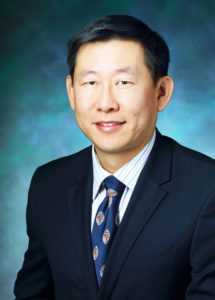What We Do:
Pain is a complicated and often debilitating medical problem that can have a major impact on your physical and mental well-being. The Department of Anesthesiology and Critical Care Medicine’s Pain Medicine Division at the Johns Hopkins Blaustein Pain Treatment Center offers patients a comprehensive range of services for patients suffering from acute and chronic pain in a supportive and compassionate environment. The multispecialty coordination between the Pain Medicine Division and experts in neurology, oncology, psychiatry and physical medicine and rehabilitation helps patients return to independence and comfort and experience a restoration in their quality of life.
Division Spotlight
Nerve Cell Helpers May Be Targeted For Pain Control
Nonpainful stimulation—think rubbing your elbow after banging it on the doorway—may reduce pain by activating nerve cell colleagues called astrocytes. The seminal “gate control theory” of pain, published in Science now over 50 years ago, has long stated that noxious signals relayed to the brain are able to be attenuated by nonpainful, large Aβ-fiber input. This formative theory focused on the neuronal aspects of spinal gating in regard to pain. However, the contribution of glia cells to pain gate control has remained unknown. In a recent study published in Science Advances, Dr. Yun Guan (Professor, Department of ACCM) and Dr. Xinzhong Dong (Professor, Department of Neuroscience) collaboratively discovered an intriguing non-neuronal gate control mechanism of physiological pain. Using state-of-the-art techniques including in vivo 2-photon calcium imaging, chemogenetic and optogenetic manipulation of spinal astrocytes, slice electrophysiology, and in vivo electrophysiology recording, they demonstrated for the first time that astrocytes in the spinal cord can be activated by nonpainful Aβ-stimulation, which subsequently inhibit the function of projecting neurons in superficial dorsal horn through astrocytic release of ATP and its derivative adenosine. These exciting findings shed new light on the role of astrocytes in the gating of pain signals, and suggest a novel non-neuronal player in the context of pain gate control, thus extending the theory beyond a strictly neuronal paradigm.
The seminal “gate control theory” of pain, published in Science now over 50 years ago, has long stated that noxious signals relayed to the brain are able to be attenuated by nonpainful, large Aβ-fiber input. This formative theory focused on the neuronal aspects of spinal gating in regard to pain. However, the contribution of glia cells to pain gate control has remained unknown. In a recent study published in Science Advances, Dr. Yun Guan (Professor, Department of ACCM) and Dr. Xinzhong Dong (Professor, Department of Neuroscience) collaboratively discovered an intriguing non-neuronal gate control mechanism of physiological pain. Using state-of-the-art techniques including in vivo 2-photon calcium imaging, chemogenetic and optogenetic manipulation of spinal astrocytes, slice electrophysiology, and in vivo electrophysiology recording, they demonstrated for the first time that astrocytes in the spinal cord can be activated by nonpainful Aβ-stimulation, which subsequently inhibit the function of projecting neurons in superficial dorsal horn through astrocytic release of ATP and its derivative adenosine. These exciting findings shed new light on the role of astrocytes in the gating of pain signals, and suggest a novel non-neuronal player in the context of pain gate control, thus extending the theory beyond a strictly neuronal paradigm.
Division Faculty and Clinical Associates
Paul J. Christo, MD, MBA, Associate Professor
Chief, Division of Pain Medicine
Peju Adekoya, MD, Assistant Professor
Oluwanifesimi Akinwamide, MD, Assistant Professor
Tina Doshi, MD, MHS, Assistant Professor
Vahid Grami, MD, MPH, Assistant Professor
Director, Pain Medicine Fellowship Program
Annie Hsu, MD, Assistant Professor
Director for Quality Assurance
Steven Levin, MD, Assistant Professor
Adeola Sadik, MD, Assistant Professor
Eellan Sivanesan, MD, FASA, Associate Professor
Director of Neuromodulation
Eric Wang, MD, Assistant Professor
Kayode A. Williams, MD, MBA, FFARCSI, Associate Professor
Advanced Practice Providers
George Marie Garber, CRNP


